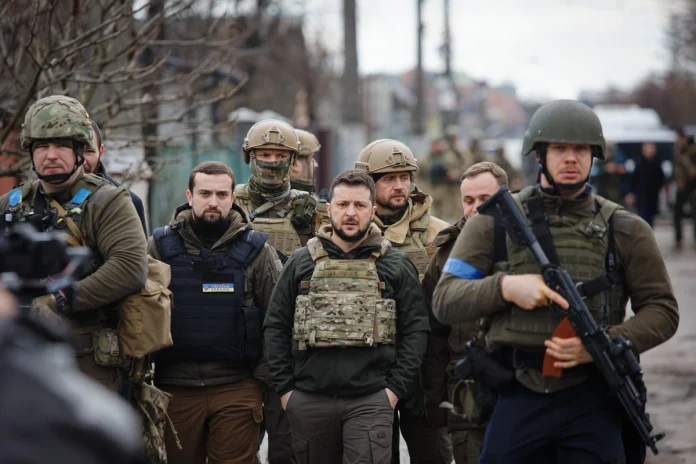External and internal conditions have created the gloomiest mood about Ukraine’s prospects for a quick and decisive victory over Russia since the first weeks of the war, The Guardian reports.
The counter-offensive was stalled by Russian minefields and fortifications. Rumours of tensions within Volodymyr Zelensky’s team and disagreements between the president and his commander-in-chief intensified late Sunday night when Zelensky fired the head of Ukraine’s military medical forces and called for operational changes in the army.
Two years of battle fatigue, the continuing loss of life on the frontline and frustration with the slow pace at which Western partners continue to deliver arms have combined to intensify the talks of negotiating a ceasefire, even though it might benefit Russia.
Moreover, the military conflict in the Middle East has diverted attention away from Ukraine and slowed the delivery of military aid. There is also growing “Ukraine fatigue” in Western capitals, and the prospect of Donald Trump’s second term in the United States looms, which could undermine support for Kyiv’s biggest ally.
US Defence Secretary Lloyd Austin arrived in Kyiv on Monday morning on an unannounced visit to reassure Ukrainian leaders of Washington’s continued support. However, plans to fund Ukraine are complicated by opposition in Congress, which could intensify next year as elections approach.
There is, however, reason for positive thinking. On the battlefield, news is emerging that Ukrainian troops have consolidated positions on the eastern bank of the Dnieper River in the southern Kherson region.
But as Ukrainians prepare for another winter of potential Russian attacks on critical infrastructure, optimism that Russia’s defeat and the return of Donbass and Crimea could be just around the corner has begun to fade. Volodymyr Omelyan, a former minister of infrastructure, stated:
It won’t be the victory that we dreamed of and it will take much longer than we thought.
Polls show that most Ukrainians oppose negotiations with Russia, especially if they include recognising lost territory. At the same time, the exhaustion of those who have been on the frontline since the conflict began, difficulties in mobilising recruits and the failure of this summer’s counter-offensive to retake territory have caused some cautious voices to suggest that a change of tactics is required.
“The choice is very simple. If we are ready to send another 300,000 or 500,000 lives of Ukrainian soldiers to capture Crimea and liberate Donbas, and if we get the right number of tanks and F16s from the west, we can do this. But I don’t see the 500,000 more people ready to die and I don’t see the readiness of the west to send the type and quantity of weapons we would need.”
Omelyan suggested that another option is “a ceasefire deal to make great reforms, become a member of Nato and the EU, then Russia will collapse and later we will take back Crimea and Donbas.” However, Zelensky stated that any negotiations would only play into Russia’s hands.
Mykhailo Podolyak, an adviser to the Ukrainian president, acknowledged that this stage of the war “requires the strongest and most difficult concentration,” to continue fighting.
“Let’s be clear, there is no option for real negotiations. All it would be would be an operational pause. Russia would use this to significantly improve its army, carry out new mobilisation and then relaunch its war, with even more tragic consequences for Ukraine.”
However, a recent interview with Zelensky by journalist Simon Shuster suggests that even in the president’s inner circle, doubts about his decisions are emerging.
We’re out of options. We’re not winning. But try telling him that.
The Hamas attacks on Israel greatly affected Ukraine’s chances in the war. Firstly, the conflict in the Middle East showed that Ukraine was not the main foreign policy issue on the minds of most Western leaders. Second, the escalation of Gaza conflict means a reduction in ammunition supplies to Ukraine.
With only a year left before the US presidential election, the potential return of Donald Trump, who has claimed he can bring a quick end to the war, is a troubling sign for Kyiv.
However, even without Trump in power, Republicans could derail the Biden administration’s attempts to aid Ukraine. Congress has been unable to pass a new aid bill for Ukraine since September, meaning military supplies to Kyiv have been cut.
Zelensky’s chief of staff, Andriy Yermak, headed to Washington last week to meet with Democrats and Republicans to convince them of the importance of weapon shipments.
Zelensky has ruled out a presidential vote next spring, but whether there is an election or not, there are now cautions about unity in times of war. Zelensky’s ratings are still high, as are those of Valery Zaluzhny, the commander-in-chief, who is considered by many to be a possible future presidential contender, although he has never voiced such a desire.
When Zaluzhny recently gave an interview to the Economist, calling the situation on the battlefield “stalemate,” Zelensky and advisers criticised his statement. Cichocki, the Polish former ambassador, noted the upsurge in political struggle in Ukraine.
Politics is back in Ukraine. The original consolidation of one unified force fighting evil, it’s different now.
